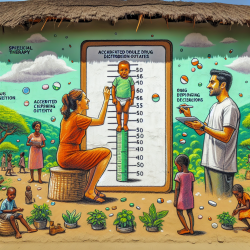Introduction
In the realm of child health, innovative interventions can significantly alter outcomes. The recent research titled "Supporting young women’s health through girl-friendly drug vendors in Lake Zone, Tanzania: protocol for the AmbassADDOrs for Health cluster-randomised controlled trial" sheds light on a groundbreaking approach that can inspire practitioners worldwide. This study focuses on improving sexual and reproductive health (SRH) outcomes for adolescent girls and young women (AGYW) in Tanzania through Accredited Drug Dispensing Outlets (ADDOs). The findings offer valuable insights for practitioners aiming to enhance child health outcomes.
The Power of Human-Centered Design
The research highlights the use of human-centered design to co-develop an intervention that promotes HIV and pregnancy prevention among AGYW. This approach resulted in the creation of the Malkia Klabu (Queen Club), a customer loyalty program that incentivizes the uptake of critical SRH products. The program provides AGYW with access to free contraceptives and HIV self-test kits, encouraging regular engagement with ADDOs.
Data-Driven Outcomes
The pilot study among 40 shops demonstrated promising results, with intervention ADDOs showing higher AGYW patronage and increased distribution of HIVST kits and contraceptives compared to traditional shops. This data-driven approach underscores the importance of using empirical evidence to guide interventions in child health.
Implementing the Lessons Learned
For practitioners in speech language pathology and other child health fields, the lessons from this study are clear:
- Embrace Innovation: Utilize human-centered design to tailor interventions that meet the specific needs of your target population.
- Leverage Data: Make data-driven decisions to evaluate the effectiveness of your interventions and adjust strategies accordingly.
- Collaborate Across Sectors: Partner with non-traditional health providers, such as drug vendors, to expand access to essential health services.
Encouraging Further Research
The study's findings encourage further research into the scalability of such interventions. Practitioners are urged to explore similar models in different contexts to address health disparities among children and adolescents.
Conclusion
The Tanzanian model offers a compelling example of how innovative, data-driven interventions can transform health outcomes for young populations. By applying these principles, practitioners can contribute to improved health outcomes for children globally.
To read the original research paper, please follow this link: Supporting young women’s health through girl-friendly drug vendors in Lake Zone, Tanzania: protocol for the AmbassADDOrs for Health cluster-randomised controlled trial.










